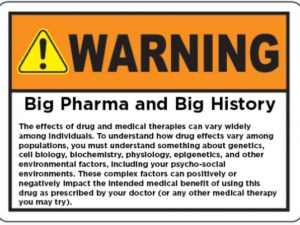Science as the Art of “Ought Management”
Science—the world’s most efficient way to both find and work with reality—is not a recipe or formula. It’s an art, the art of “Ought Management.”
The core insight behind science goes something like this: To get what you want, set aside what you want long enough to see what is. In other words: To bring about what you think ought to be, you must first ignore what you think ought to be, long enough to see what is. Better atuned, you’ll be able to take actions better suited to what is and therefore more effective in bringing about what you think ought to be.
Science is not limited to nerds in white coats. It’s the prevailing ideal for truth-seeking in every aspect of life—our business, personal, political, economic, social, and even religious quest for truth. Religion may seem the odd one on that list, but when you think of religion not as a quest for what’s true about the universe but what is true to our spiritual appetites, the religious quest is a dead ringer for science.
Science is the careful pursuit of an effective division of labor between the pursuit of what is and what ought, what is true and what we hope is possible. It’s “Ought Management,” not “Ought Elimination.”
Some of my favorite statements about science come from Buddhists:
Truth waits for eyes unclouded by longing.
In other words, to see what is, let go of your preference for what you think ought to be.
Enlightenment is easy if you have no preferences.
In other words, you’ll become one with what is when you let go of what you think ought to be.
These Buddhist statements are like science koans. They’re paradoxes—statements that imply their own negation:
Truth waits for eyes unclouded by longing, but it also waits for a longing for truth.
Enlightenment is easy if you have no preferences, but if you didn’t have a preference for enlightenment, you wouldn’t be interested in an easy path to it.
See, science can’t live wholly with or without oughts. Oughts contaminate and distort our scientific efforts to find out what is, but if we were truly ought-free, totally indifferent, never preferring one state to another, we wouldn’t bother to figure out what is.
We try to figure out what is going on with cancer because we think there ought to be less cancer. If we didn’t think there ought to be less cancer, we wouldn’t bother with scientific research. We’d just let a thousand cancers bloom.
Because our oughts both animate and contaminate our efforts to see what is, our oughts must be managed. And you can’t manage oughts if you don’t recognize them. To name them is to tame them. We have to get good at identifying our oughts when they fly by in thought and conversation. Ought Management doesn’t come naturally, so we teach it, by providing an education in science and critical thinking. I’ve long been a champion of teaching both, but lately I’ve noticed that the way they’re taught is often inefficient or even counterproductive in teaching Ought Management.
Science is often taught as a list of facts, descriptions, and explanations as though it were the elimination of all oughts. The scientific method is often taught as though it were merely empiricism, the dispassionate formulaic testing of what is, as though Ought Management has nothing to do with it.
This approach breeds a society of self-proclaimed scientific thinkers professing to be interested only in what is, people aping their misconception of scientists as people who check their oughts at the door, if they haven’t eliminated them entirely in their quest for truth.
Critical thinking is usually taught with rhetoric since they’re two sides of the same coin. Rhetoric is how to smuggle oughts into statements; critical thinking is how to catch the smuggler, and throw the smuggled oughts overboard.
But a little knowledge of critical thinking and rhetoric turns out to be a dangerous thing because we use them first and foremost to promote our personal oughts. Employing a double standard, we use critical thinking primarily to find fault in the arguments made against us, and rhetoric primarily to defend our arguments. To illustrate, take any politician you hate. Claiming scientific objectivity, he uses critical thinking to attack his opponents’ arguments, and will spare no rhetoric in defense of his own arguments.
I will call this effect “The Critical Paradox”: Paradoxically, the more critical thinking (and rhetoric) you learn, the more likely you are to mismanage your oughts. When it comes to learning critical thinking, knowledge is power that corrupts.
Before science and critical thinking, Ought Management was taught through the trivium, three subjects—logic (aka critical thinking), rhetoric, and grammar—taught to all university students in the Middle Ages. I imagine a Novum Trivium—a new trivium for a well-rounded education in Ought Management. It would teach rhetoric and critical thinking largely by means of social psychology, the study of influence. It would replace grammar with what could be called “introspective psychology,” the cultivation of introspective intelligence. Teaching introspective psychology is like teaching emotional intelligence, but is more pointedly focused on the problems of personal Ought Management.
Among the first principles I would teach in introspective psychology is the paradox fundamental to all inquiry, the paradox at the core of science:
“The Science Paradox”: The more you want to know the answer to a question, the more likely you are to harbor a bias about what the answer ought to be.
Originally published on Mind Readers Dictionary.



